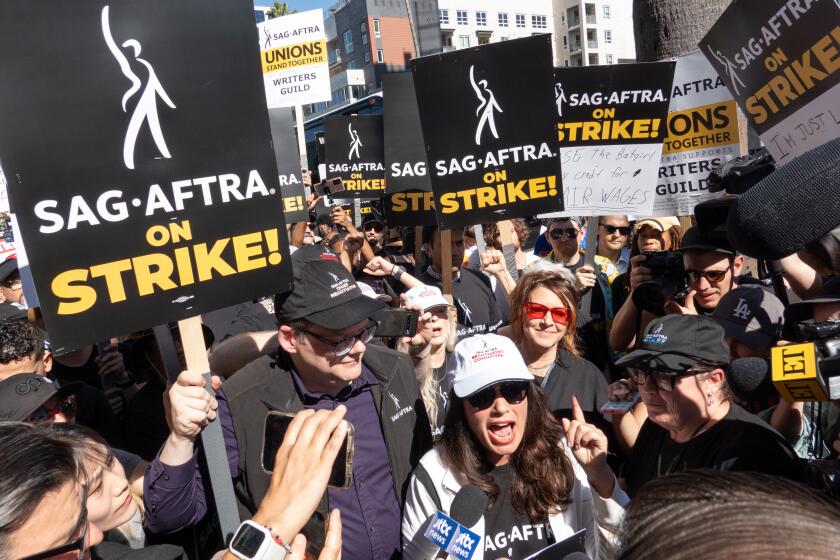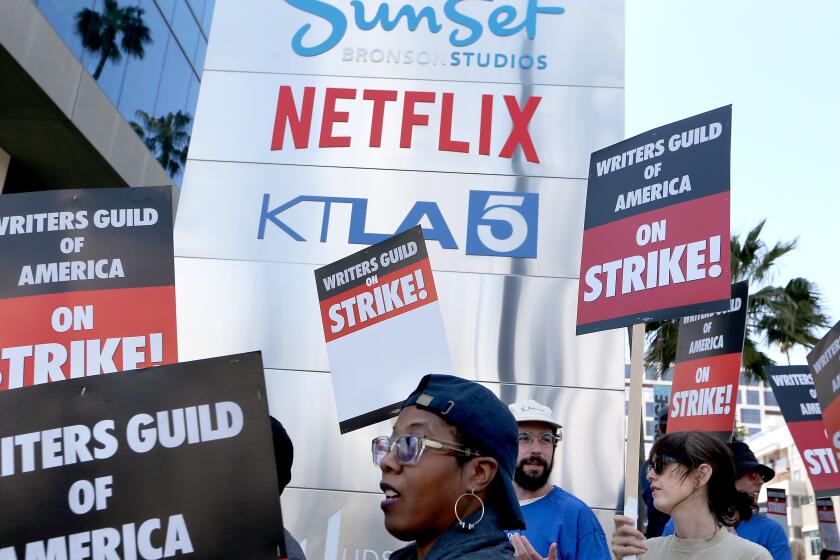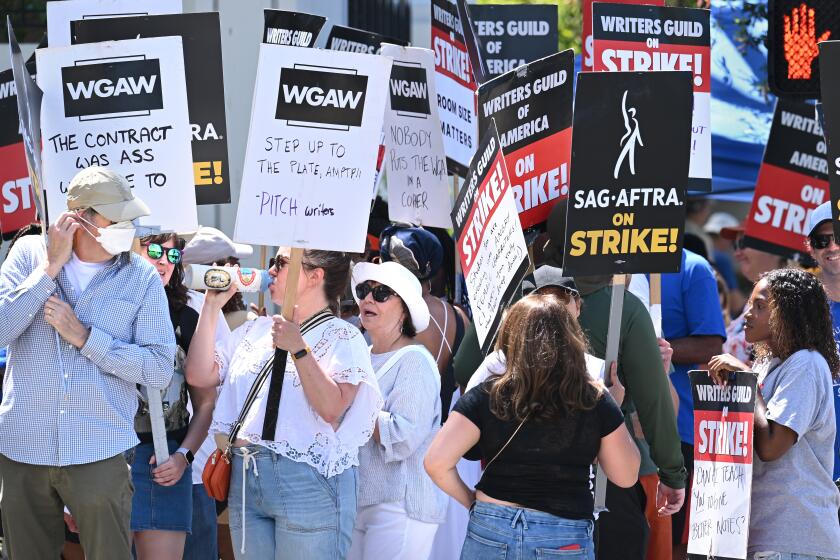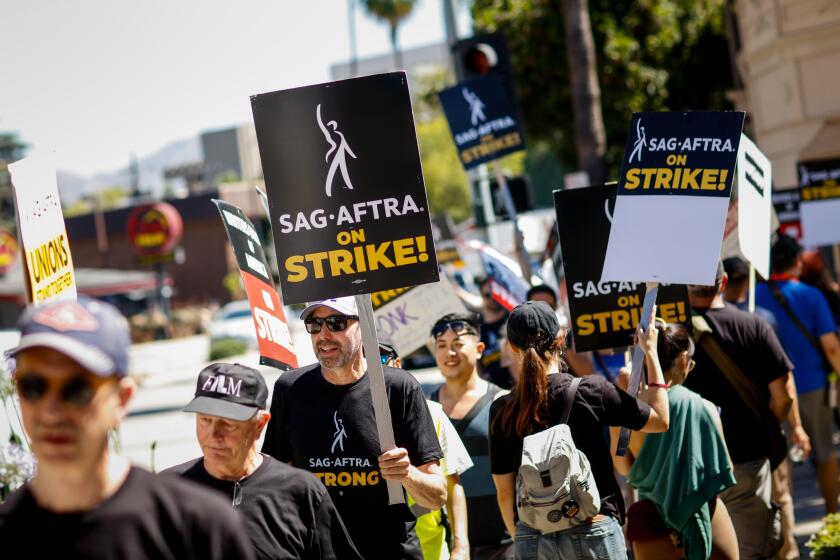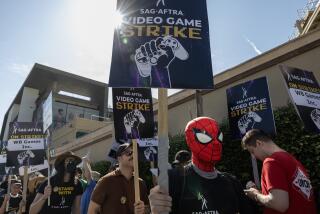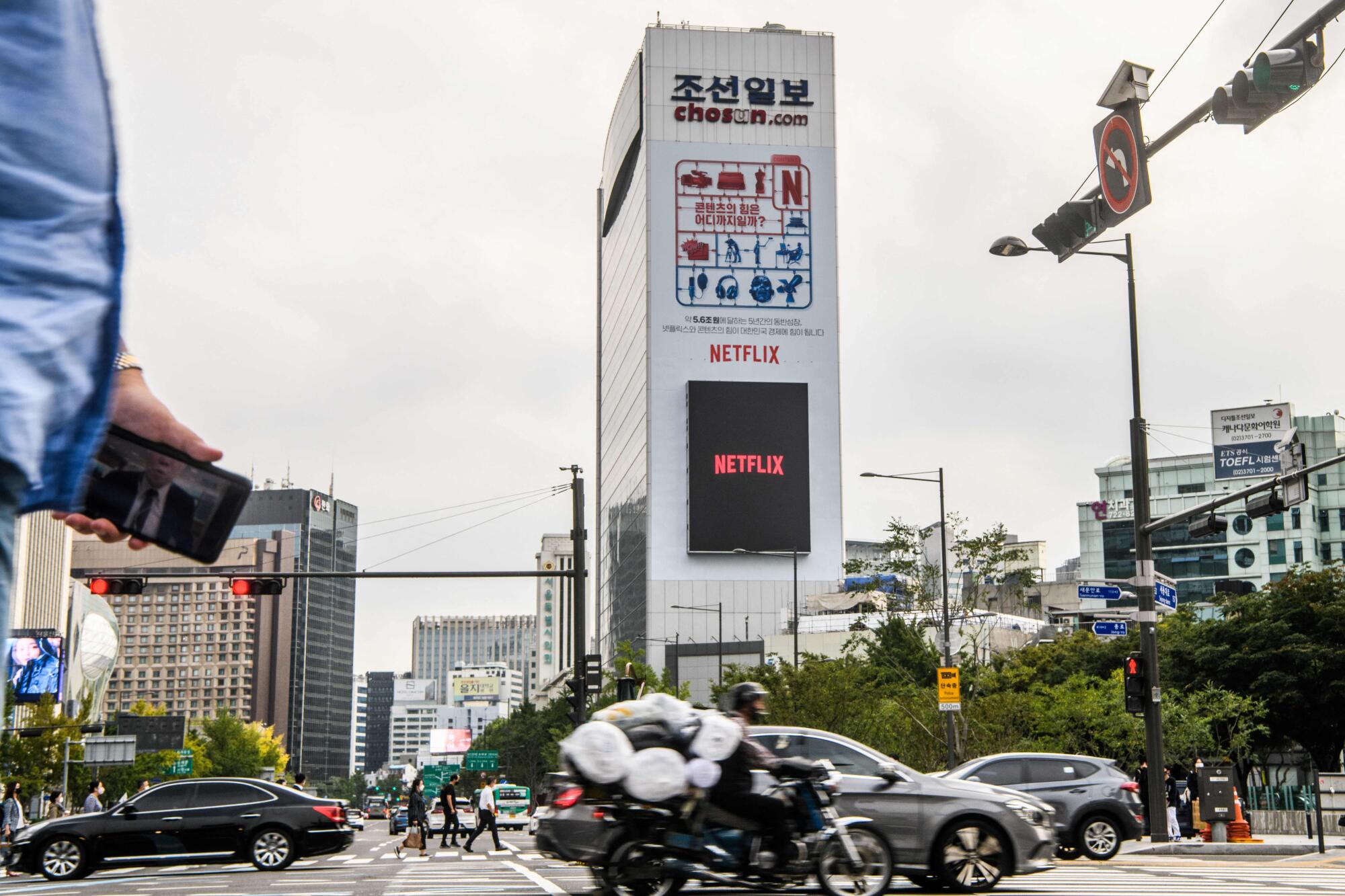
- Share via
SEOUL — As news of the SAG-AFTRA strike broke in mid-July, Song Chang-gon, a 51-year-old actor and current president of the Korea Broadcasting Actors Union, was still waiting to hear back from Netflix, a company that was proving to be difficult to get ahold of.
The phone number for its South Korea office was unlisted on the usual websites, but several months earlier, Song had asked around until he finally managed to obtain the personal number of a Netflix Korea executive. Unhappy with the fact that the company didn’t pay its South Korean actors residuals — a form of royalty paid to credited talent when a show is reused after the first airing — he had left several calls and text messages.
The situation struck him as absurd.
Netflix has a vast presence in South Korea. Yet at times it felt to him as though the company, which outsources all of its production to local studios, wielded its influence from behind a curtain.
“One of their first priorities when entering the local market should be to establish some channel of communication with groups like us,” Song said. “But there’s no answer at all.”
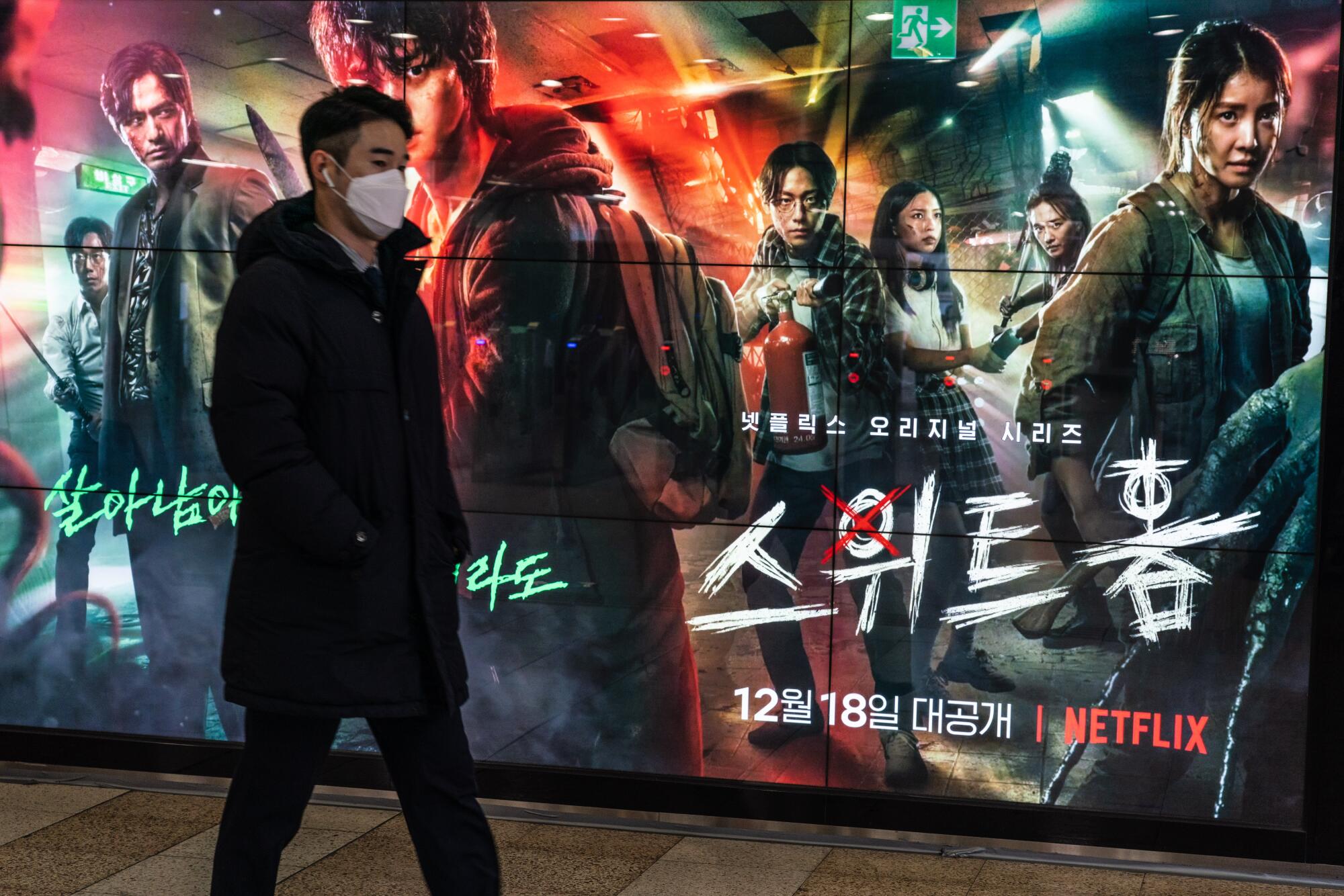
The actors union, echoing similar concerns from South Korean writers and production workers, says that Netflix has long profited from a system that underpays supporting actors, and that better compensation is long overdue.
A Netflix spokesman declined to say whether the company would meet with the union. In a written statement, the company said it follows all local laws and regulations and that as a streaming service — and not a broadcaster — it is not required to pay residuals.
South Korean content is likely to become even more important to Netflix it seeks to weather the Hollywood writers’ strike. But many writers and producers in the country feel exploited by the streaming giant.
When Netflix arrived in South Korea in 2016, Song and his colleagues at the Korea Broadcasting Performers’ Rights Assn., the union’s partner organization that collects and distributes residuals, had held off on approaching the streamer.
“A precondition for that conversation about residuals was Netflix’s business successfully taking off here,” said Kim Ju-ho, secretary-general of the rights association.
It is clear that this precondition has been met — and more.
Netflix, a $160-billion company, owes at least some of its success to its South Korean originals like “Squid Game,” which remains its most-watched series. The streamer recently announced that it would invest an additional $2.5 billion to acquire additional Korean content over the next several years.
“Netflix has made a lot of money from South Korean content,” Kim said. “It’s now time to meet.”
::
Union officials here have been keeping a close eye on the developments in Hollywood.
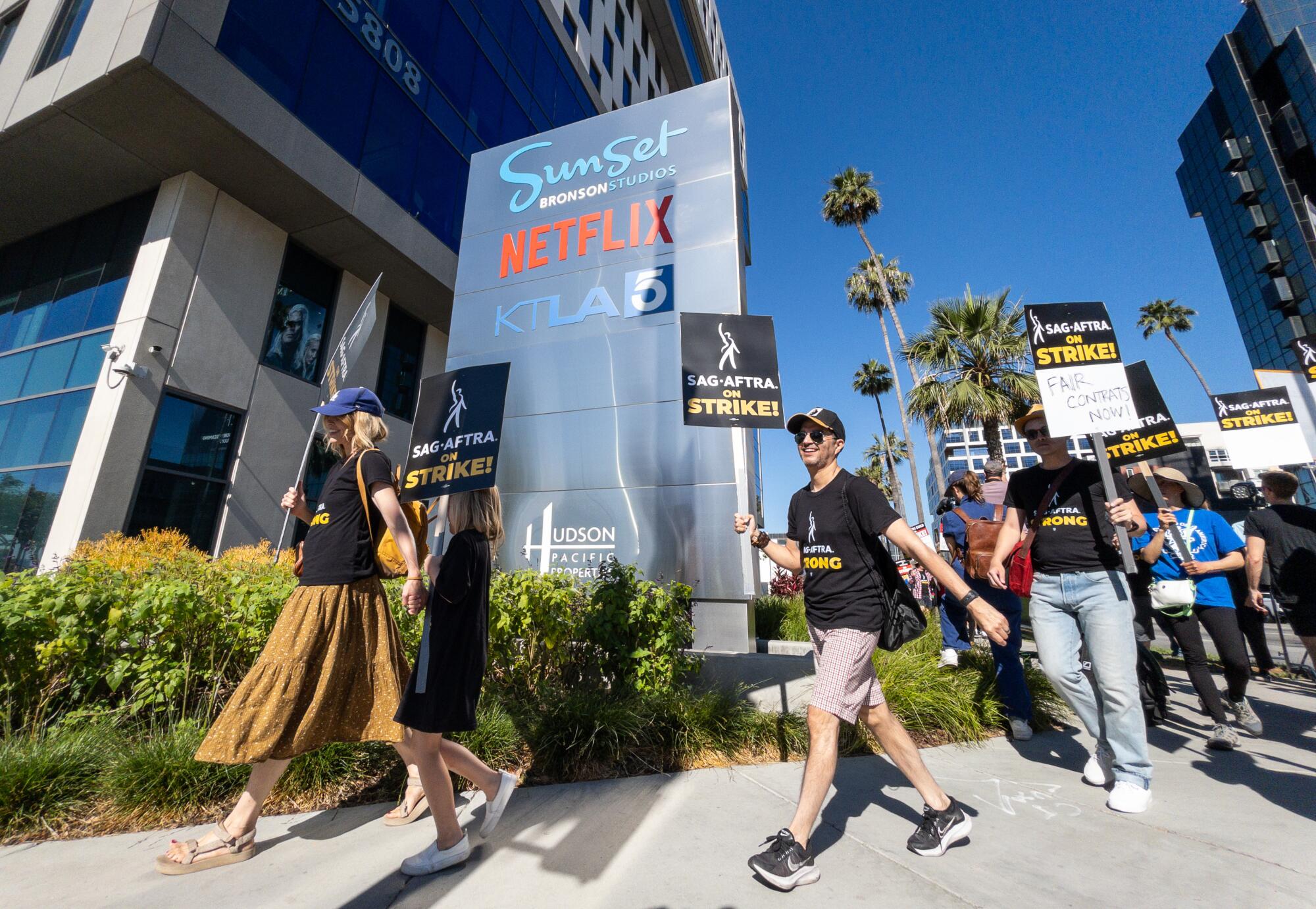
Besieged by the largest worker strike there in 60 years, Netflix probably does not want another labor dispute on its hands, let alone in a market that has been reliable in large part because labor costs can be kept low. And thanks to its outsourcing model, Netflix is not legally classified as an employer in South Korea and doesn’t have to bargain with unions.
Though Korean television networks have increasingly outsourced much of their production in the same way, they have continued to engage with the actors union — and continue to pay residuals. Even local streamers like Tving or Wavve, despite being deep in the red and trailed by constant bankruptcy rumors, have met with the rights association to address the issue.
“Netflix makes use of the country’s broadcasting and content infrastructure just as much as anyone else,” said Yoo Min-suk, policy director at the actors union. “That’s why we’re saying they have an obligation to meet with us.”
Far from simply being another player on the field in South Korea, Netflix is the most influential creative force in the business.
Actors joined writers on picket lines on Friday as SAG-AFTRA launched its own strike against studios and streamers after the two sides failed to reach a deal for a new contract.
“The history of the South Korean industry can be divided into before Netflix, and after Netflix,” said an executive at television network Munhwa Broadcasting Corp., or MBC, who requested anonymity because he wasn’t authorized to speak to the media. “They’ve brought in huge budgets and snapped up all the big-name actors and writers and directors.”
Once a drama powerhouse, his company has recently found itself subordinated to the position of outsourced Netflix supplier.
It was an MBC producer, given special permission to take outside work, who created the Netflix hit “Physical 100,” a reality show that held a top 10 spot in the streamer’s non-English leader board for six weeks earlier this year.
“Compared to how well it did, we sold it for peanuts,” the executive said.
At one internal meeting, opinions had been split about the offer, in which MBC would hand over all the intellectual property to Netflix for a one-time payout of “a few million dollars.”
But Netflix’s name holds a special cachet — an imprimatur of global consumability.
“Management decided that if it’s distributed through Netflix, we’re not walking away with nothing,” the executive said. “We basically gave up profit for exposure.”
::
Song acknowledges that plenty of good has come from Netflix too.
The streamer’s production budgets, low by U.S. standards but large by Korean ones, have opened up a golden age of prestige television in the country, popularizing science fiction and other genres that had previously been too expensive and risky to put on network television. The company has created jobs and given Korean content an unprecedented global outlet.
For the most part, actors, writers and directors are eager to work with the streamer, given that a Netflix appearance is a unique opportunity to burnish one’s personal brand.
“The problem is that Netflix’s big production budgets aren’t evenly distributed — most of this money goes to the star actors or big-name screenwriters,” Song said. “For the majority of supporting actors, wages have stagnated or effectively decreased.”
Why many members of the Writers Guild of America have targeted streaming giant Netflix in their fight for higher streaming residuals.
Indeed, the Netflix-led shift toward streaming has been a gold rush for top talent — even without residuals.
A-listers negotiate their own deals and oftentimes treat any foregone residuals as baked into their one-time payday, which industry insiders estimate have now broken $400,000 an episode — about on par with the cast of HBO’s “Succession.”
On the opposite end of the spectrum, per-episode rates for supporting actors — who receive neither residuals nor premiums — start at about $300.
These rates are based on network television pay scales negotiated by the actors union before the takeover by streaming. But because Netflix shows have far shorter seasons than the typical Korean network drama — the 16-episode miniseries was once the television standard — total payouts are much smaller, according to the union.
In addition, Song said, shooting a Netflix episode often takes far longer than the one or two days that were typical for Korean network shows. “Shoots for Netflix originals, especially genres like zombies or creature features, are far more labor-intensive,” he said. “Actors are still expected to show up for however many shoots it takes to film one episode without enough additional compensation.”
SAG-AFTRA approved side agreements allowing more than 100 independent film projects and series to move forward amid the strike, but the deals have spurred debate.
Some companies will bump up the episode fee if shooting exceeds three days, according to one producer of a recent original Netflix drama who — fearful of upsetting business relationships — spoke on condition that she not be identified. “So in the case of an actor who is usually paid $300, that would be upped to around $450,” she said.
Still, in one complaint Song recently received from a supporting actor who auditioned for a Netflix original series, the production company asked for up to 15 shoots for a single episode — while offering only an increase so small it essentially amounted to several days of unpaid work.
And because actors do not receive any per diems for food, transportation or lodging, Song said that many on the lower end of the pay range are still barely getting by, thanks to out-of-pocket expenses accumulated over multiple shoots.
In its statement, Netflix said that expenses such as meal or overnight allowances are written into their production budgets, but that these are ultimately overseen by the production company.
“We ensure supporting actors are compensated at or above local wage standards, and we work closely with our production partners to ensure all parties are committed to the fair compensation and treatment of actors,” Netflix said.
::
Low labor costs, at least for now, have cushioned South Korean actors from another bane at the center of the SAG-AFTRA strike: the use of artificial intelligence actors.
Substituting such “digital twins” for human actors is already happening, though in more limited situations than SAG-AFTRA’s worst-case scenario, in which twins can be animated with such precision that they can entirely replace humans.

On “Black Knight,” a South Korean sci-fi series that Netflix released in May, a local virtual reality company called Replica scanned 10 of the main cast members to create digital twins that were used for high-risk action scenes or to retroactively insert a key actor in a scene.
While the technology is still too costly for things like close-ups, the ultimate goal, said chief strategy officer Shane Jeon, is developing it further to replace human actors affordably.
Actors fear artificial intelligence will replace them. Entertainment lawyers predict the future is more complicated than that.
This scenario, he added, would still depend on a framework of informed consent and fair compensation for the use of actors’ likenesses.
“But it will be a very, very long time until that day comes in South Korea,” Jeon said. “The cost of hiring human actors here is much too cheap for that.”
For voice actors, prospects are far more immediate and dire.
Unlike Hollywood, where SAG-AFTRA has said that its voice actors are protected by union contract provisions that limit the reuse of recorded performances for artificial intelligence purposes, no such agreement is in place in South Korea.
The union says that its members who have worked on Netflix voiceovers — which are also outsourced to local studios — report that contract signings are hurriedly carried out on-site in a way that seems intended to sidestep matters of consent.
“All the Netflix contracts were really long and they were all in English,” said one voice actor, who requested anonymity for fear of losing work. “There was never enough time to read through it carefully. And even if I did object to something, it would just mean that I wouldn’t be taking the job.”
The popularity of “Squid Game” is inseparable from South Korea’s very real crisis of mounting household debt, gaping inequality and a weak social safety net.
The only explanation the employees would give her as they flipped through the pages, she said, was that all of her rights were being transferred away.
“There’s a huge fear that if a big company like Netflix sets a precedent by deciding to go through with AI voice actors, our jobs could just vanish overnight,” she said.
In April, the New York Times reported that “a recent Netflix contract sought to grant the company free use of a simulation of an actor’s voice “by all technologies and processes now known or hereafter developed, throughout the universe and in perpetuity.”
The voice actor believes the contract she signed said more or less the same. But to this day, she has been unable to personally verify this because her requests for her own copy were rebuffed by the third-party studio. Union officials say they have also been stymied.
“I still haven’t been able to see a Netflix contract with my own eyes,” said Choi Jae-ho, secretary-general of the voice actors chapter.
In its statement to the Los Angeles Times, Netflix said that, although English contracts are the standard across all their markets, the company is not aware of any instance in which signed contracts were withheld from voice actors who signed them.
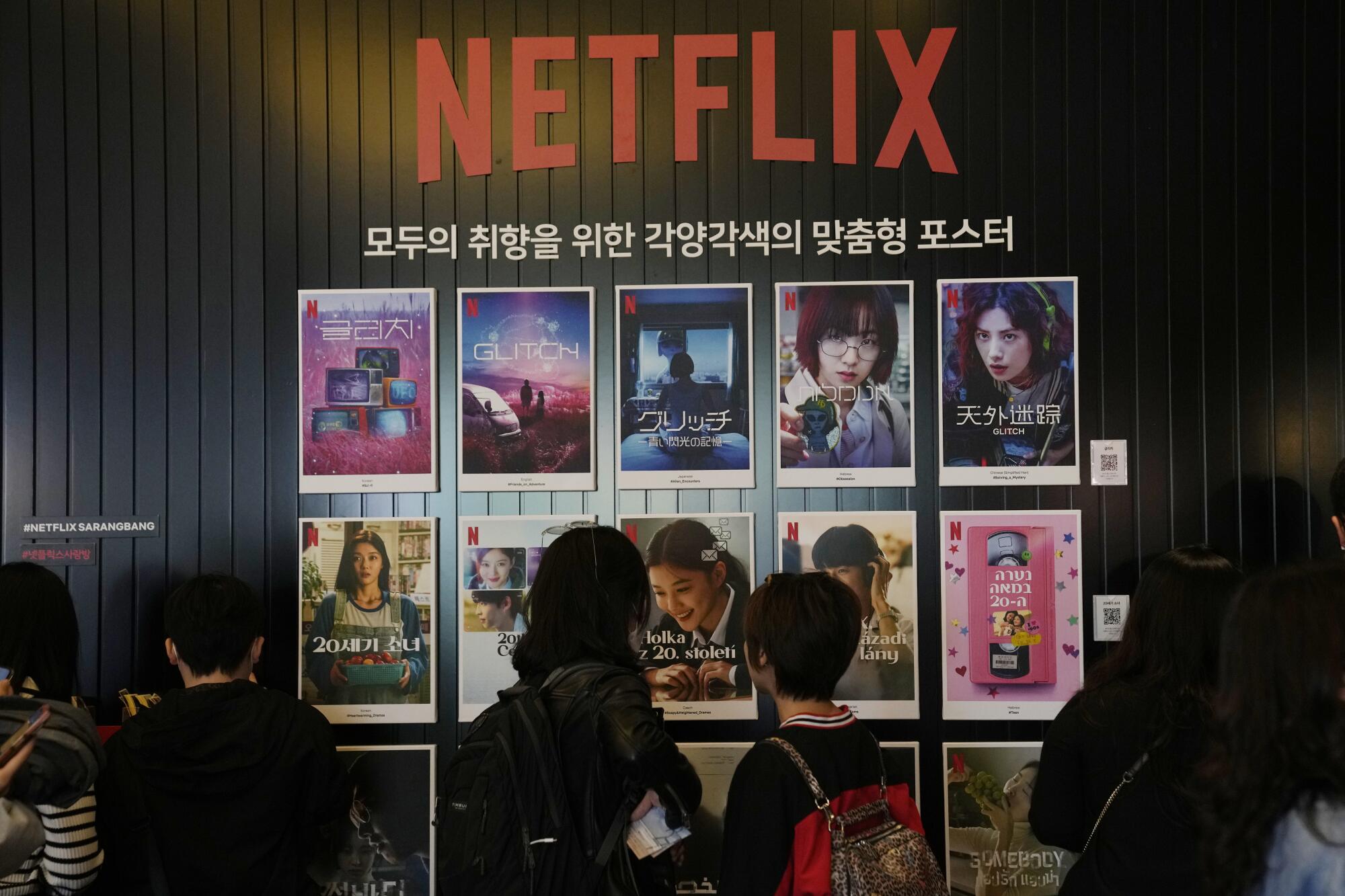
A spokesperson for Iyuno Korea, the local partner that handles most of Netflix’s voiceover work here, said that a Korean version of the contract is provided whenever requested and that the company is “working on an updated format that includes both Korean and English simultaneously throughout the contract for ease of reference.”
::
Meanwhile, Song and Kim have kept themselves busy preparing for the meeting with Netflix that they believe will eventually come.
They have pored over SAG-AFTRA’s residuals structure, which determines an actor’s residuals payout from several factors, such as the number of subscribers of the streamer airing the show.
The union has plans to propose a new wage scale that will impose minimums based on a production’s total budget.
“But for now, our only request to Netflix is that South Korean performers be given the same residuals terms that U.S. actors are getting under SAG-AFTRA agreements,” Kim said.
As SAG-AFTRA members join writers on picket lines, the fallout will disrupt Hollywood film and TV productions worldwide. ‘There’s going to be blood in the water,’ said one analyst. ‘This will not end well.’
Steeped in the new realities of global streaming, in which foreign content is serving as a buffer for Netflix against the strikes in Hollywood, the union is also contemplating the larger implications of the fight.
“There is undoubtedly common ground that can be found between us and SAG-AFTRA,” Song said. “It would be helpful for similar organizations representing actors around the world to engage with one another, to build up a sense of solidarity. I think that’s important.”
He mulled over whether to write a message of support.
Maybe, Kim suggested, they could even fly to Hollywood and deliver the greeting in person — and while they’re at it, knock on Netflix’s door.
More to Read
Sign up for Essential California
The most important California stories and recommendations in your inbox every morning.
You may occasionally receive promotional content from the Los Angeles Times.

